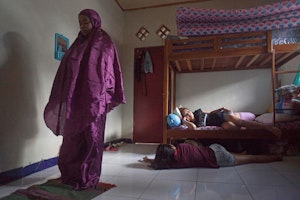No Documents, No Doctor? No Longer
By Olga Ochneva & Olga Rychkova
Jamila used to be one of tens of thousands of drug users, migrants, and others in Kyrgyzstan denied health care simply because she did not have a permanent address. Now, thanks to work by Asteria, an Open Society Foundations grantee, she and others are able to get health care without being excluded by the old, Soviet-era system.
Kyrgyzstan, like most former Soviet countries, requires a passport as proof of identity in order to access basic social goods, including health care, education, employment, and welfare. Having no passport means the inability to be formally employed or access essential health services. As in Soviet times, passports are still issued according to the obsolete system of propiska, or the formal registration of citizens based on their permanent address. This out-of-date system means that social services, like health care, are distributed only according to the number of people registered in a certain area. People living on the margins of society, like Jamila, are first to be excluded from these services. Without a permanent address—on top of the stigma attached to her status as a former inmate and a drug user—Jamila cannot access all the social and health benefits available under propiska.
While she was still in prison, a volunteer gave Jamila the phone number and address of Asteria, a harm reduction organization in Bishkek that also runs a small shelter for homeless women who use drugs. Most women who come to Asteria for harm reduction services, or who stay in its shelter, face the same issue: They have no passports or identity documents, and no address to register at in order to get propiska. According to Tatyana, Asteria’s social worker, the greatest challenge is to support women who are pregnant. Prenatal care is also denied to those without a passport, leaving women in anguish over the health of their future child. In fact, most of these women see a doctor for the first time once already in labor, having been brought to the emergency room by an ambulance.
Tired of having to see women left by the state without the most basic health services, Asteria started negotiations with Kyrgyzstan’s Ministry of Health and primary care providers in search of a solution. Countering bureaucratic arguments by the authorities with realistic solutions and the real-life stories of their clients told by the women themselves, Asteria managed to convince the Ministry that the situation needs to change. And finally, in June 2013, the Ministry of Health revised the current regulation to allow any organization in Kyrgyzstan that runs a shelter to register its clients with the local primary care provider, without the requirement of passport or propiska. This is good news for hundreds of people in crisis situations—migrants, victims of domestic violence, former inmates, LGBTI people, and people who use drugs—who will no longer have to use the emergency room as their only health care option.
Jamila, who now works as an outreach worker at Asteria, is expecting her first child this fall. While she still does not have a passport, she is looking forward to her first doctor appointment—literally, the first in her adult life.
Olga Ochneva is an advocacy coordinator at Asteria, a harm reduction organization in Kyrgyzstan.
Until January 2018, Olga Rychkova was a program officer for the International Harm Reduction Development Program.


